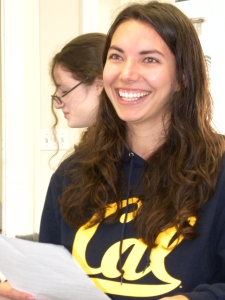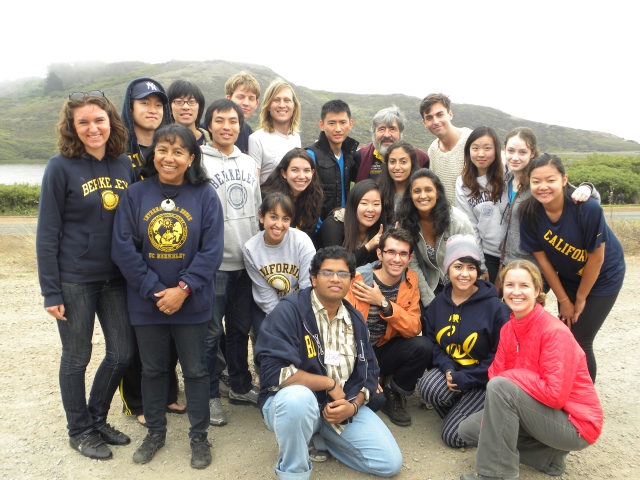“We don’t see things as they are, we see them as we are.” — Anaïs Nin
Learning about other cultures has always been a passion of mine. I’m guessing if you’ve lived, are living, or want to live at International House, it is one of yours too.
My mother teaches English as a Second Language at a primary school in West Sacramento, California. From a young age, I spent afternoons and days off in her classroom engaging with children who had immigrated with their families to the US from countries as foreign as Russia, Ukraine, Mexico and Vietnam. Exposure to people from other cultures has been my normal. But even though I’ve learned about the folklore, foods, and families of my mom’s students, it wasn’t until I participated in I-House’s Intercultural Leadership Initiative (ILI) that I took the time to fully consider the implications of how I see the world on my interactions with people from other cultures.
My class of ILI participants consisted of 25 people from 19 different countries- South Korea, the US, Japan, Germany, India, China, and Mexico to name a few. Together we spent a couple evenings together every month learning about cultural and individual leadership and communication styles and how to use them to cross cultural barriers. However, ILI is not about pegging people into cultural stereotypes, but about making an attempt to understand where other people are coming from and in turn understanding yourself.
Of the 25 participants, there was a tremendous amount of variation between individual styles of leadership and communication even among people from the same countries or “culture region.” Likewise, even if two people were from opposite sides of the globe, having grown up in seemingly opposite cultures does not necessarily mean that their personal styles are that different. In fact, I often felt more at odds with some of my fellow Americans than I did with participants from other countries.
Now that I am living in Colombia, I believe that some kind of intercultural training should be mandatory for anyone who plans to live in another country or with people from another country. After 2 months, there are many things about Colombian culture that I still don’t understand. But one of the most important things I learned from ILI was that just because I don’t understand something- no matter how hard I’ve tried to understand it or how frustrating it is for me to work within that cultural perception, doesn’t mean that it is pointless or ridiculous.

Learning a different set of rules
Prior to ILI, I don’t think I would have ever admitted to feeling that way about another culture. But it was during a game we played at an ILI retreat that I realized that I do tend to harbor some animosity towards things I don’t understand. In the game, we were split into pairs and each pair was given a different set of rules for how to play the game. We were not told that we were playing by different rules. While at first, I hardly understood the rules I was given, as we started to play with other pairs who had a different understanding of how the game should be played, I became more and more adamant that my rules were the correct rules.
The realization that I could give into this form of hegemony confused me. How could I ever achieve my dream of becoming a diplomat if I was really that dictatorial? After all, the game is almost a perfect analogy for how xenophobia causes all sorts of problems in the real world. Did my refusal to play by another set of rules make me a hegemonic xenophobe? I later realized that in real life, unlike in the game, I know that we are all playing by different sets of rules- whether our perspectives are shaped by our religious beliefs, social norms set by our peers, the media, or our parents, our past experiences, or by little slips of paper, we all walk through life with different understandings of how to be, how to act, how to lead, and how to communicate with our fellow human beings.
But, instead of letting the confusion and frustration get to me, I am now more aware of my confusion and frustration when I encounter a cultural norm that I don’t understand. While this doesn’t absolve me of said frustration, it does allow me to take a step back and approach confusing situations in a different way. Every once in a while, my classes will inform me that class is going to be cancelled the next day because of a holiday, a class project, or simply for a day of rest. “Profe, tranquila,” is a regular comment from my students as I struggle to figure out how I can move hours around for that week to accommodate their busy schedules and still prepare them to pass their exams on time, whereas at home I would know well ahead of time if a class were to be cancelled and therefore be able to plan accordingly. Sometimes, it hurts my brain more to understand these cultural differences more than my attempts at communicating in two languages. But acknowledging those differences and the difficulties of trying to operate using my own cultural orientation within another cultural context doesn’t mean that I have to give up who I am, it only means that I may have to adapt in certain situations.
While learning and living in other cultural contexts, I have of course learned about other cultures and ways of life, but I have also learned that understanding how I see the world, or that the rules that I bring to the table may be different from those of someone else, is much more useful in bridging cultural barriers than trying to learn and understand every other culture on the planet. For anyone hoping to live abroad or work with people from other cultures, ILI will provide you with an essential toolkit for how to deal with potentially stressful situations abroad and even in your own backyard.
———————
The applications for the Fall 2014 Intercultural Leadership Initiative are due on Monday, September 8, 2014.
To find out about requirements, eligibility or to apply visit: ihouse.berkeley.edu/ILI



